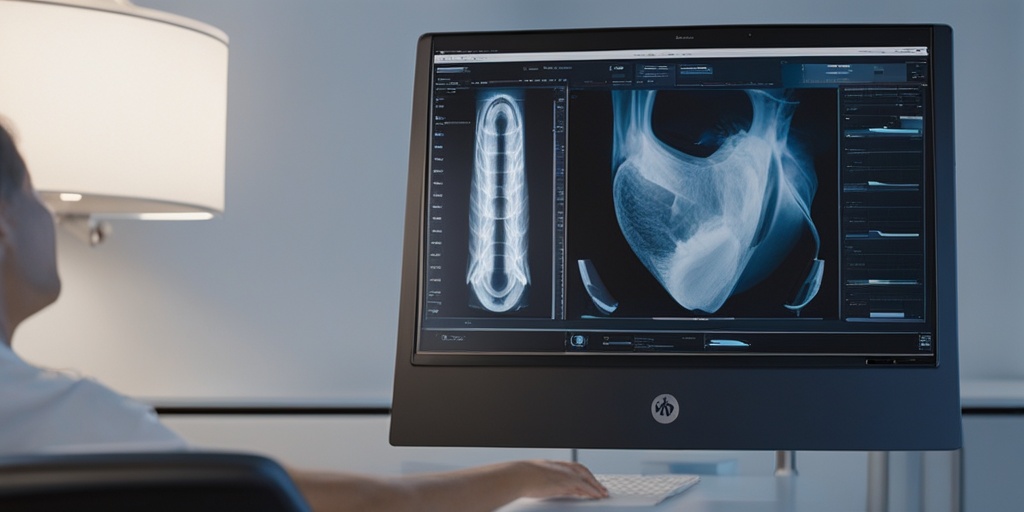What Is Early Fetal Ultrasound?
When you’re expecting, every moment counts, and getting a glimpse of your little one can be an exciting experience. An early fetal ultrasound is a non-invasive medical imaging technique that uses high-frequency sound waves to produce images of your baby inside the womb. This diagnostic tool helps healthcare providers assess fetal development, detect potential issues, and provide reassurance during pregnancy.
What to Expect During an Early Fetal Ultrasound
Typically, an early fetal ultrasound is performed between 6-10 weeks of gestation. During the procedure, a transducer (a small probe) is gently moved over your abdomen to capture images of your baby. You might feel a slight pressure, but it’s usually painless. The entire process usually takes around 15-30 minutes.
The ultrasound technician will measure the size of your baby, check the heartbeat, and examine the embryo’s development. They might also look for any signs of twins or other multiple pregnancies. After the scan, your healthcare provider will discuss the results with you and answer any questions you may have.
Why Is Early Fetal Ultrasound Important?
An early fetal ultrasound is crucial for several reasons:
Detecting Potential Issues
Early detection is key. An early fetal ultrasound can identify potential issues, such as:
- Fetal growth restriction
- Abnormalities in the embryo’s development
- Multiple pregnancies
- Placenta previa or other placental issues
Identifying these issues early on allows your healthcare provider to monitor your pregnancy more closely and develop a plan to address any concerns.
Reassurance and Bonding
An early fetal ultrasound can provide emotional reassurance and help you bond with your baby. Seeing your little one’s tiny heart beating or their tiny limbs moving can be a truly magical experience 🥰. It’s a great way to connect with your baby and feel more involved in your pregnancy journey.
Accurate Dating and Pregnancy Planning
An early fetal ultrasound helps determine the exact gestational age of your baby, which is essential for:
- Accurate due date calculation
- Prenatal care and screening schedules
- Identifying potential risks or complications
By knowing the exact gestational age, you can plan your pregnancy more effectively and make informed decisions about your care.
Remember, an early fetal ultrasound is just one of the many tools used to ensure a healthy pregnancy. If you have any concerns or questions, don’t hesitate to reach out to your healthcare provider or consult with a trusted resource like Yesil Health AI for evidence-based health answers.
Stay informed, stay empowered, and enjoy this incredible journey to motherhood! 🤰♀️

Deciding About Prenatal Testing
As soon as you find out you’re pregnant, you’re bombarded with a multitude of decisions to make. From choosing a prenatal care provider to deciding on a birth plan, it can be overwhelming. One of the most important decisions you’ll make during your pregnancy journey is whether or not to undergo prenatal testing. In this article, we’ll explore the ins and outs of prenatal testing, including the benefits of early fetal ultrasound, to help you make an informed decision that’s right for you.
What is Prenatal Testing?
Prenatal testing refers to a range of tests and screenings that can detect potential health issues in your unborn baby. These tests can identify genetic disorders, chromosomal abnormalities, and other conditions that may affect your baby’s development. Prenatal testing can be categorized into two main types: screening tests and diagnostic tests.
Screening Tests vs. Diagnostic Tests
Screening tests are non-invasive and pose no risk to your baby. They’re designed to identify women who are at high risk of having a baby with a genetic disorder or chromosomal abnormality. Examples of screening tests include:
- Maternal serum screening (MSS)
- Cell-free DNA (cfDNA) screening
- Ultrasound screening
Diagnostic tests, on the other hand, are invasive and carry a small risk of miscarriage or other complications. They’re used to confirm the presence of a genetic disorder or chromosomal abnormality. Examples of diagnostic tests include:
- Chorionic villus sampling (CVS)
- Amniocentesis
Why Consider Prenatal Testing?
Prenatal testing can provide valuable information about your baby’s health, allowing you to make informed decisions about your pregnancy and prepare for any potential challenges ahead. Some benefits of prenatal testing include:
- Early detection of potential health issues: Prenatal testing can identify genetic disorders and chromosomal abnormalities early on, giving you time to plan and prepare for your baby’s needs.
- Reduced anxiety and uncertainty: Knowing the results of prenatal testing can alleviate anxiety and uncertainty, allowing you to focus on a healthy pregnancy and birth.
- Informed decision-making: Prenatal testing can provide valuable information to help you make informed decisions about your pregnancy, such as whether to continue the pregnancy or make arrangements for your baby’s care after birth.
Benefits of Early Fetal Ultrasound
Early fetal ultrasound is a non-invasive prenatal testing option that uses high-frequency sound waves to produce images of your baby in the womb. This test is usually performed between 6-10 weeks of pregnancy and can provide valuable information about your baby’s development.
What Can Early Fetal Ultrasound Detect?
Early fetal ultrasound can detect a range of conditions, including:
- Twin or multiple pregnancies: Early fetal ultrasound can confirm the presence of twins or multiples, allowing you to plan and prepare for a multiple birth.
- Fetal size and growth: This test can measure your baby’s size and growth, identifying any potential issues with fetal development.
- Structural abnormalities: Early fetal ultrasound can detect structural abnormalities, such as heart defects or neural tube defects.
Benefits of Early Fetal Ultrasound
Early fetal ultrasound offers several benefits, including:
- Accurate dating of pregnancy: This test can confirm your due date, ensuring you receive accurate prenatal care and scheduling.
- Early detection of potential issues: Early fetal ultrasound can identify potential health issues early on, allowing for prompt intervention and care.
- Reassurance and peace of mind: Seeing your baby’s image on the ultrasound screen can be a reassuring and emotional experience, providing peace of mind during your pregnancy journey.
Remember, prenatal testing is a personal decision that depends on various factors, including your age, medical history, and personal preferences. By understanding the benefits and limitations of prenatal testing, including early fetal ultrasound, you can make an informed decision that’s right for you and your baby. 🤰♀️

Risks and Limitations of Early Fetal Ultrasound
When it comes to early fetal ultrasound, it’s essential to understand the risks and limitations involved. While ultrasound technology has revolutionized prenatal care, it’s not without its drawbacks. In this section, we’ll delve into the potential risks and limitations of early fetal ultrasound, so you can make an informed decision about your pregnancy care.
What Are the Risks of Early Fetal Ultrasound?
While ultrasound is generally considered safe, there are some potential risks to be aware of:
- False reassurance: A normal ultrasound result can provide false reassurance, leading you to overlook potential issues that may arise later in pregnancy.
- Inaccurate results: Early fetal ultrasound results can be inaccurate, especially if the fetus is small or in an awkward position.
- Unnecessary anxiety: Abnormal results can cause unnecessary anxiety and stress, which can negatively impact your pregnancy experience.
- Overuse of resources: Unnecessary ultrasounds can lead to overuse of medical resources, increasing healthcare costs and potentially delaying care for those who need it most.
What Are the Limitations of Early Fetal Ultrasound?
In addition to the risks, there are also limitations to early fetal ultrasound:
- Detection limitations: Early fetal ultrasound may not detect all potential issues, such as certain birth defects or chromosomal abnormalities.
- Operator dependence: The accuracy of ultrasound results depends on the skill and experience of the operator.
- Equipment limitations: The quality of the ultrasound equipment can impact the accuracy of the results.
It’s essential to discuss the risks and limitations of early fetal ultrasound with your healthcare provider to determine if it’s right for you. Remember, ultrasound is just one tool in prenatal care, and it should be used in conjunction with other diagnostic tests and regular check-ups.
Preparing for an Early Fetal Ultrasound
If you’ve decided to undergo an early fetal ultrasound, it’s essential to prepare yourself for the experience. Here are some tips to help you get ready:
What to Expect During the Ultrasound
During the ultrasound, you’ll typically lie on an examination table, and a probe will be placed on your abdomen. The probe uses high-frequency sound waves to produce images of your fetus. The entire process usually takes around 15-30 minutes.
Tips for a Successful Ultrasound
To ensure a successful ultrasound, follow these tips:
- Stay hydrated: Drink plenty of water before the ultrasound to help the probe move smoothly over your abdomen. 💧
- Wear comfortable clothing: Wear loose, comfortable clothing that allows easy access to your abdomen.
- Arrive early: Plan to arrive 10-15 minutes before your scheduled appointment to complete any necessary paperwork.
- Ask questions: Don’t hesitate to ask your healthcare provider any questions or concerns you may have during the ultrasound.
By understanding the risks and limitations of early fetal ultrasound and preparing yourself for the experience, you can make an informed decision about your pregnancy care. Remember to stay calm, ask questions, and prioritize your health and well-being throughout your pregnancy journey. 🤰♀️

What to Expect During an Early Fetal Ultrasound
Congratulations on your pregnancy! 🎉 As you embark on this exciting journey, you’re probably eager to catch a glimpse of your little one. An early fetal ultrasound is a crucial step in monitoring your baby’s development and detecting any potential issues. But what can you expect during this procedure? Let’s dive in and explore the details. 🤔
Preparation is Key
Before your ultrasound, your healthcare provider will likely give you some instructions to follow. These may include:
- Drinking plenty of water to ensure your bladder is full, which helps the ultrasound technician get a clearer image of your uterus.
- Avoiding certain foods or drinks that can cause gas, as this can interfere with the ultrasound.
- Wearing comfortable, loose-fitting clothing that allows easy access to your abdomen.
The Ultrasound Procedure
During the ultrasound, you’ll lie on an examination table, and a trained technician will apply a gel to your abdomen. This gel helps the ultrasound probe (transducer) move smoothly over your skin and capture high-quality images. The technician will then move the transducer over your abdomen, taking images of your uterus and the fetus from various angles.
The entire process usually takes around 15-30 minutes, depending on the type of ultrasound and the complexity of the examination. You might feel some discomfort or pressure as the technician presses the transducer against your skin, but this is usually mild and temporary.
Understanding Early Fetal Ultrasound Results
After the ultrasound, your healthcare provider will review the images and share the results with you. This can be an anxious moment, but understanding what to expect can help alleviate some of that anxiety. 😊
What Can Be Detected During an Early Fetal Ultrasound?
An early fetal ultrasound can detect various aspects of your baby’s development, including:
- Fetal heartbeat: The ultrasound can detect your baby’s heartbeat, which is usually visible around 6-7 weeks of gestation.
- Fetal size and growth: The ultrasound measures the length of your baby from crown to rump, which helps estimate gestational age and detect any growth abnormalities.
- Multiple pregnancies: If you’re carrying twins or multiples, the ultrasound can identify this and monitor each fetus separately.
- Uterine and placental health: The ultrasound evaluates the health of your uterus and placenta, ensuring they’re functioning properly.
What If Something Is Detected?
In some cases, the ultrasound may detect potential issues or abnormalities. If this happens, your healthcare provider will discuss the findings with you and explain the next steps. This might involve further testing, monitoring, or consultations with specialists.
Remember, an early fetal ultrasound is a crucial tool for ensuring a healthy pregnancy. While it’s natural to feel anxious, being informed and prepared can help you navigate this journey with confidence. 💕

Early Fetal Ultrasound: Deciding About Your Pregnancy
Reaching the 6-8 week mark of your pregnancy can be an exciting yet nerve-wracking time. This is when you’ll typically have your first ultrasound, and it’s natural to have questions and concerns. In this article, we’ll guide you through what to expect during an early fetal ultrasound and help you make informed decisions about your pregnancy.
What to Expect During an Early Fetal Ultrasound
An early fetal ultrasound, also known as a dating ultrasound, is usually performed between 6-10 weeks of pregnancy. During this non-invasive procedure, a probe called a transducer is placed on your abdomen to capture images of your baby. This ultrasound helps determine:
- Gestational age and due date
- Fetal heartbeat and movement
- Number of fetuses (in case of twins or multiples)
- Fetal size and development
Deciding About Your Pregnancy
After the ultrasound, you may have questions and concerns about your pregnancy. Here are some common scenarios and what to do next:
Frequently Asked Questions
What if I don’t see a heartbeat? 🤔
If no heartbeat is detected during the ultrasound, it may indicate a miscarriage or a blighted ovum (anembryonic pregnancy). Your healthcare provider will discuss the next steps with you, which may include further testing or a follow-up appointment.
What if my baby is measuring small or behind? 🤝
If your baby is measuring smaller than expected or behind in development, your healthcare provider may recommend additional testing, such as a non-stress test or biophysical profile, to monitor fetal growth and well-being.
Can I have an ultrasound earlier than 8 weeks? 🕰️
While it’s possible to have an ultrasound earlier than 8 weeks, it’s generally not recommended unless there’s a medical concern. This is because the fetus is still developing, and the accuracy of the ultrasound may be limited.
How does HCG relate to ultrasound results? 📊
Human chorionic gonadotropin (HCG) is a hormone produced during pregnancy. HCG levels can affect ultrasound results, and your healthcare provider may use HCG levels to confirm pregnancy or detect potential issues.
What if I have a history of pregnancy loss or complications? 💔
If you’ve experienced pregnancy loss or complications in the past, it’s essential to discuss your medical history with your healthcare provider. They can provide guidance and support to help you navigate your current pregnancy.
Remember, every pregnancy is unique, and it’s essential to stay informed and communicate openly with your healthcare provider. By understanding what to expect during an early fetal ultrasound and addressing any concerns you may have, you can make informed decisions about your pregnancy and feel more confident and prepared for the journey ahead.




